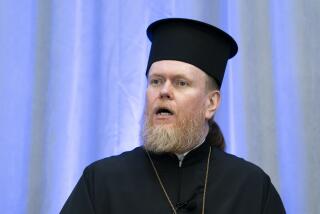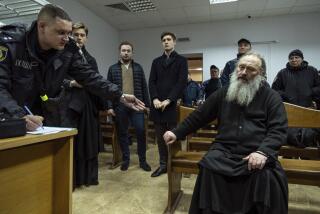‘Scrabbling for the Faithful’ in Russia : Evangelism: American visitors urged not to undercut churches that have survived 70 years of oppression.
- Share via
At an Orthodox seminary in St. Petersburg, Russia, an American church visitor observed several U.S. evangelists trying to imprint their particular brand of Christianity on students training for the Russian church’s ministry.
“A variety of Western evangelists would corner students in the dormitory hallways or other places, trying to proselytize them,” said the Rev. Elaine Stanovsky, head of the Greater Church Council of Seattle.
“I was appalled,” she added. “It broke my heart.”
She said such activity undercuts Russian churches, both predominant Russian Orthodoxy and Baptist, Pentecostal, Methodist and other Protestant churches that have survived 70 years of oppression.
“It’s plain arrogance for Western evangelists to go in and say we know best how to evangelize the nation,” Stanovsky said. “A more humble and ecumenical approach is to support revitalization of the churches that have endured all those years.”
She said many U.S. churches are doing that--helping indigenous churches restore property and providing Western resources and relief aid--but some groups with misplaced evangelistic zeal are “scrabbling for the faithful.”
Stanovsky, a United Methodist, isn’t the first to consider outsiders wooing converts in Russia as potentially offensive and harmful.
“The temptation of rich Western Christians is to rush to the East with ready-made programs instead of openly listening to the needs and wisdom of Christians who have suffered so much,” said Lutheran Bishop Eero Huovinen of Helsinki, Finland, commenting on an evangelizing group’s plans for preaching missions last fall in cities along the Volga River.
“Russia is not a confessionally neutral country where you can pass by the churches that already exist there. The mission work directed eastward is only justified if those churches which already exist and their faith are taken seriously.”
Both Roman Catholics and Protestant denominations from the West have directed a steady stream of aid--including Bibles, Christian teaching materials, food relief and some personnel--to Christians in the former communist countries.
Generally, the work is done in cooperation with existing East European churches, thousands of whose buildings have been returned to them by the new parliament-led government. Many need repairs, but congregations have swelled.
United Methodists named a bishop to coordinate their mission work there--Bishop Ruediger Minor of Dresden, Germany. He is posted in Moscow to oversee longtime congregations and foster new ones.
He stressed ecumenical cooperation and sensitivity to indigenous church workers, saying that Russia should not be treated as “a place for church planting like a new suburb of an American city.”
Yet despite the cooperative intentions, United Methodists last week sent a delegation headed by their chief ecumenical officer, Bishop Melvin G. Talbert of San Francisco, to “iron out some rough spots” with Russian Orthodoxy.
In November, U.S. Roman Catholic bishops extended for a fourth year their annual collections to aid churches in Eastern Europe, with much of the funds providing scholarships for seminarians and religious personnel.
Aside from the work by U.S. denominations, many parachurch groups and independent evangelists have also flocked to the region, often acting on their own without regard to Russian churches.
There are exceptions. For example, evangelist Billy Graham had the backing of Russian Orthodox leaders and the participation of Russian Protestant churches in his Moscow crusade in October.
More to Read
Sign up for Essential California
The most important California stories and recommendations in your inbox every morning.
You may occasionally receive promotional content from the Los Angeles Times.













